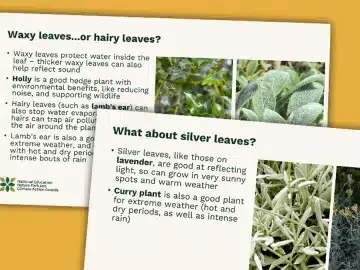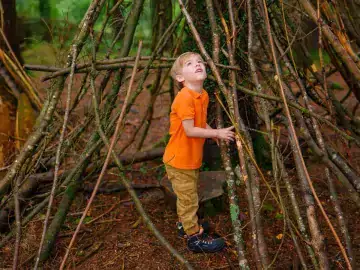
Leaf identification
This activity encourages learners to look closely and start to identify the similarities and differences of trees found in their outdoor space. They will ask questions and ‘really look’ to try and find the tree the leaf came from. This also introduces the concept of identifying plants in their site, by exploring the space and making observations.
Learners will be given a leaf from their site, and they will need to look closely at the size, colour, texture, and smell to help them find their ‘leaf partner’, who has the same leaf as them. Encourage them to also take close notice of the edges of the leaves – are they smooth or spiky? They will need to use nature vocabulary to describe their leaf.
Once they have found their ‘leaf partner’, the learners will then explore the space to try and find the tree that their leaf came from.
Preparation
What you need
- Leaves from trees on your site
Location
Outdoors
Useful guidance
Resources
Step by step
- To prepare before the activity, collect two or more leaves from trees in your outdoor area, or from the ground. Each learner will need one leaf. Try to collect pairs from a variety of tree species – pine needles, big leaves, different shapes and colours, etc.
- Distribute the leaf pairs you have collected to the group, so that everyone has one leaf each.
- Ask learners to talk to each other and compare their leaves, discussing the shape, size, edge and colour. They will need to find the person with the same leaf as them.
- Note: Remember that some learners may have a leaf from the same tree, but one might be bigger/smaller due to the age of the leaf – can they still find their leaf partner?
- Once they have found their ‘leaf partner’, ask the learners to walk around the outdoor space and try to find the tree that their leaf came from.
Reflection
Facilitate a discussion to further understand the trees in your learning site: “How many different species of tree does our site have?” “If we did this activity in another season, what would be different?”
Curriculum links
This activity can be used to support curriculum knowledge and skill development in understanding the world, communication and language and science, alongside enhancing nature education, with age appropriate adaptations.
What to try next

Design a plant
Begin activity
Anatomy of a tree
Begin activity
Investigate Weather and Microclimates
Begin activityThumbnail image: © RHS, Credit: RHS / Jim Wileman